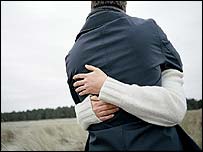|
By Michelle Roberts
BBC News health reporter in Copenhagen Thursday, 23 June, 2005, 07:01 GMT 08:01 UK |

More men are having children later
|
Until now, both were level pegging - 40% of cases linked to men, 40% to women and 20% to joint problems.
However, the European Society for Human Reproduction and Embryology found rates of an IVF treatment typically used to help male infertility have risen.
It said a number of factors including declining sperm quality due to environmental toxins may be involved.
A male problem
Use of ICSI (intra-cytoplasmic sperm injection), in which a single sperm is injected into the egg to fertilise it, made up only 43% of IVF cycles in 1997, but accounted for 52% of cycles in 2002.
|
"
Having a family when you are younger is always a good plan
"
Dr Alan Pacey, British Fertility Society
|
There were more than 122,000 ICSI cycles and nearly 113,000 IVF cycles in 2002, the ESHRE committee announced at its annual meeting in Copenhagen on Wednesday.
The data came from 24 European countries.
Dr Anders Nyboe Anderson, coordinator of the committee, said: "We do not really know why ICSI has become more prevalent. There are probably many reasons."
It could be that the causes of infertility are shifting.
He added: "We see less and less infertility caused by severe tubal [fertility tube] problems in women, probably because of better sexual protection due to the risk of Aids during the last 15 years."
However he said the data on male subfertility showed it appeared to be increasing.
Age-related problems
Dr Anderson said: "Maybe environmental factors are playing an increasing role as the planet becomes more polluted and factors that disrupt the endocrine system are in the food chain."
But he said it was more likely that ICSI was becoming the preferred method of assisted reproduction, as the technique has improved since its introduction in the early 1990s.
He said private clinics tended to use ICSI rather than IVF to improve the chance of success first time, even though both techniques have the same take-home-baby rate.
Another theory is that men, like women, are increasingly putting off starting a family until they are older, when fertility is lower, Dr Anderson said.
More and more men aged 50-65 are now attending fertility clinics - men over 40 making up nearly a quarter of consultations, the study said.
Impact
In separate research, a team of Canadian scientists have found damage to DNA in sperm increases with age.
By analysing the sperm of 2,134 men they found a wide variation in quality that was linked with age.
DNA damage was far higher in men over 45 than in younger men - men aged 45 had double the damage of those younger than 30.
He said data from the US showed that the birth rate for fathers older than 35 had increased by nearly 20% between 1980 and 1995.
Lead author Dr Sergey Moskotsev, of the Mount Sinai Hospital in Toronto, told the ESHRE conference: "The effect of age on male infertility is particularly interesting because of the growth in the number of men choosing to father children at older ages.
"The combination of increased female factor infertility, increased sperm DNA damage, low levels of DNA repair and increased abnormalities in conventional semen parameters will have a pronounced impact on their reproductive potential."
Dr Allan Pacey, Senior Lecturer in Andrology at the University of Sheffield and Secretary of the British Fertility Society, said: "This should remind us that the male reproductive system is not immune from the effects of ageing.
"Whilst the effects of aging are not as dramatic as are seen in women, subtle changes in DNA quality could seriously affect a couple's ability to conceive, or could lead to miscarriage or even health problems in any children born.
"Having a family when you are younger is always a good plan."